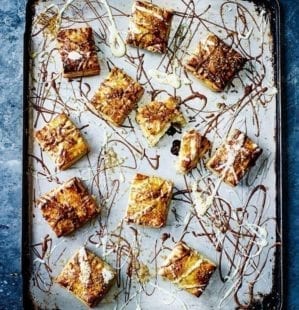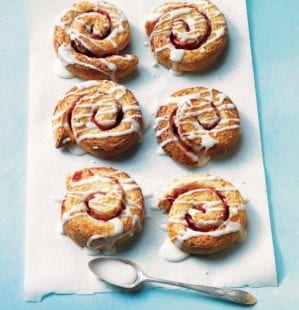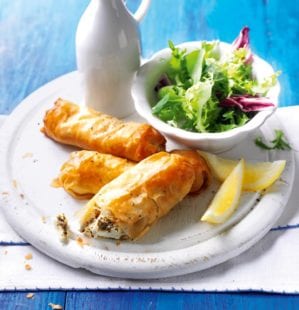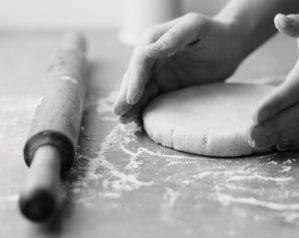
Spiced coconut pastries
- Published: 28 May 20
- Updated: 18 Mar 24
Writer Dina Begum makes these sweet pastries for the festival of Eid and are one of the reasons she looks forward to the festivities so much. Beautifully crisp on the outside and with a sticky coconut filling, these Indian sweet treats are super moreish.
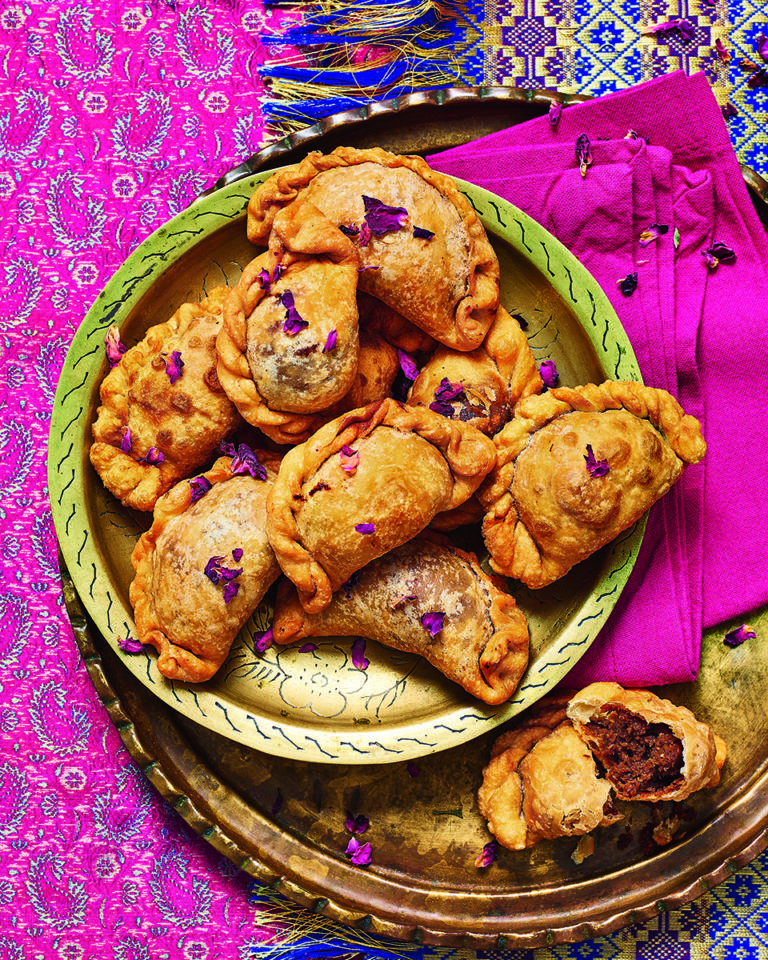
-
Makes 16
-
Hands on time 1 hour 20 min, including resting time
Ingredients
For the filling
- 1 small cinnamon stick
- 4 cardamom pods
- 1 bay leaf
- 150g desiccated coconut
- 1 tsp ghee (clarified butter)
- 180g date molasses (see Know How)
For the dough…
- 250g plain flour, plus extra to dust
- ¼ tsp salt
- ½ tsp sugar
- 2 tbsp vegetable oil, plus extra for deep-frying
- Dried edible petals to decorate (optional; from souschef.co.uk)
You’ll also need…
- Digital probe thermometer;tray lined with kitchen paper
Method
- To make the filling, bring 400ml water to the boil in a medium saucepan, add the cinnamon, cardamom and bay leaf, then simmer for 1 minute. Stir in the coconut, then turn the heat to low. Cook for 12-15 minutes, stirring occasionally, until the coconut has softened and absorbed all the water. Remove from the heat.
- In a frying pan over a medium heat, melt the ghee, then stir in the coconut mixture. Add the date molasses, then cook gently for 7-8 minutes more until the molasses has blended with the coconut and the mixture is soft with a caramel consistency. If it’s a bit runny, cook it for 2 minutes more. Take it off the heat and leave to cool completely (it will thicken as it cools).
- Meanwhile, to make the dough, combine the flour, salt, sugar and oil in a bowl. Mix in 125ml water, then add more, a tablespoon at a time, until you have a soft, firm dough. Knead a few times, then cover and leave to rest for 20 minutes.
- When you’re ready to make the pastries, shape heaped tablespoons of the cooled filling mixture into rough balls. Knead the dough well on a lightly floured surface for about 5 minutes. Divide into 16 equal portions, then roll each into a thin round about 0.5cm thick and 8cm in diameter.
- Put a ball of filling on the lower half of each round of pastry, about 1cm from the edge, then fold the pastry over to cover the filling to make a half-moon-shaped parcel. To seal the pastry, crimp the edges or press together lightly with a fork, making sure you ease out any air bubbles. Repeat with the remaining dough and filling.
- Fill a deep frying pan/wok with oil to a depth of about 5cm, then put over a high heat until the oil reaches 190°C on a digital probe thermometer (or a cube of bread turns golden in 30 seconds). Carefully fry up to 5 pastries at a time, turning the heat down to very low as soon as you’ve added the pastries. They’ll take 4-5 minutes and should be pale golden when done. Lift out the cooked pastries with a slotted spoon, then drain on the prepared tray and keep warm. Repeat with the remaining pastries, bringing the oil back up to temperature each time, then lowering to fry each batch.
- Scatter the pastries with petals (optional) and serve warm with a cup of tea (or see make-ahead).
- Recipe from May 2020 Issue
Nutrition
- Calories
- 201kcals
- Fat
- 11.9g (5.6g saturated)
- Protein
- 2g
- Carbohydrates
- 22.8g (6.6g sugars)
- Fibre
- 2.4g
- Salt
- 0.1g
delicious. tips
If you don’t fancy doing the whole recipe, you can make shortcrust pastry tarts with the filling.
The secret to the flaky pastry is in the tiny bit of oil added to the dough, along with salt and sugar – the latter helps give these pastries their wonderful golden hue.
Make sure the pastries are plunged into very hot oil over a high heat, before cooking very slowly over a low heat. This gives a crisp exterior and helps them to cook through evenly.
In Bangladesh the pastries are made with fresh coconut filling, but desiccated
coconut works, too – as long as you don’t rush the rehydration process.The pastries will keep well for a day at room temperature and up to a few days in the fridge, covered. Refresh in a medium-hot oven for about 5 minutes before serving. The filling will keep in a lidded jar for up to a week.
Date molasses (also known as date syrup) is a velvety smooth syrup made from pressed date pulp. It adds a complex dried-fruit flavour with a sweet finish. Use it in baking, stir into porridge or use to finish savoury bakes and casseroles. Buy from larger supermarkets or online at Amazon.
Toasting the coconut in ghee before the molasses is added results in a fragrant caramel filling with hints of cinnamon, cardamom and bay – the triumvirate of Bangladeshi dessert spicing.
Buy ingredients online
Rate & review
Rate
Reviews
Subscribe to our magazine
Food stories, skills and tested recipes, straight to your door... Enjoy 5 issues for just £5 with our special introductory offer.
Subscribe
Unleash your inner chef
Looking for inspiration? Receive the latest recipes with our newsletter

